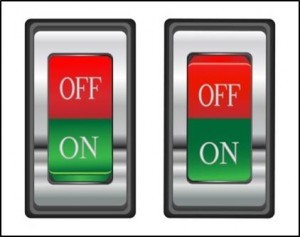Absolutely … not.
 A handful of English adjectives are considered absolutes. They cannot be compared. No degrees exist within them, and their application is a binary proposition. On or off. Yes or no, nothing in between.
A handful of English adjectives are considered absolutes. They cannot be compared. No degrees exist within them, and their application is a binary proposition. On or off. Yes or no, nothing in between.
These words behave like a simple light switch. No rheostat, no dimmer – just light or no light.
And yet people want to impose degrees on them that are not possible. The words sound impressive, but (since their correct usage would make the statement untrue) writers qualify them and think they’re getting away with something. These qualified absolutes often show up in advertising. Shocking, I know.
Here are some absolutes, common misuses, and what the writers could have said instead:
only (One. No more. There is no other.)
Not: one of the only
Say: one of the few
unique (One of a kind. Nothing else compares.)
Not: pretty unique
Say: distinctive, original
always (In every case. No exceptions.)
Not: nearly always
Say: usually, often
never (In no case. Not ever.)
Not: almost never
Say: seldom, rarely
dead (All life functions have ceased.)
Not: the victim was nearly dead
Say: gravely injured, near death
opposite (Antithetical. Mutually incompatible.)
Not: Her political ideas are almost completely opposite from mine.
Say: We disagree on most political issues.
In trying to explain sovereignty as an absolute concept, my college Government professor used the old sovereignty-pregnancy example, pointing out that you can’t be “a little bit” of either. The point was to respect the absolute nature of some words that cannot be qualified or compared. Students who failed to grasp this notion grew up to toss around perfect as if it just meant nice.
But be forewarned: If you claim to be practically perfect in every way, you’d better be Mary Poppins.
Like TextCPR on Facebook!



